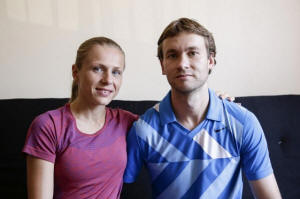|
Stepanov, a former employee of the Russian
anti-doping agency RUSADA, helped expose massive doping problems
in Russia in 2014 with his athlete wife Yulia Stepanova and the
pair have since fled the country and live in hiding in North
America.
Their evidence triggered a World Anti-Doping Agency (WADA)
investigation that alleged the Russian government was complicit
in an elaborate scheme of institutional doping.
"I have met a couple of months ago with Yulia Stepanova and
Vitaly Stepanov. We have exchanged our positions and they were
very good and friendly discussions," Bach told reporters.
"This resulted in the fact that the IOC has since then supported
Vitaly Stepanov."
Bach did not provide any details on the kind of support the IOC
was offering the pair.
"We are benefiting from his advice on anti-doping matters with
regard to Russia and are supporting Yulia Stepanova and hope she
can find a new National Olympic Committee which may allow her to
qualify for the next Olympics," he said.
Stepanova cannot return to Russia, let alone compete for the
country, for fear of her life.
The IOC refused to allow the middle-distance runner to compete
at the Rio de Janeiro Olympics as an independent athlete, citing
an older doping sanction in a decision that was criticized at
the time.
Bach had rejected claims of a lack of support for Stepanova at
the time of the Rio Games, saying: "We are not responsible for
dangers to which Ms. Stepanova may be exposed."
Moscow consistently denied state involvement and the Stepanovs
were denounced as traitors.
But on Tuesday the IOC banned Russia as a team from the
Pyeongchang winter Olympics over the nation's doping scheme at
the 2014 winter Games, revealed by another Russian
whistleblower, Grigory Rodchenkov.
(Reporting by Karolos Grohmann, editing by Ed Osmond)
[© 2017 Thomson Reuters. All rights
reserved.] Copyright 2017 Reuters. All rights reserved. This material may not be published,
broadcast, rewritten or redistributed.
 |
|






